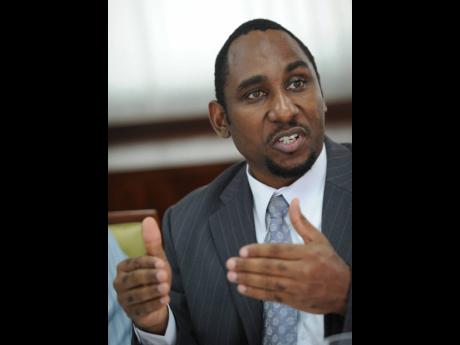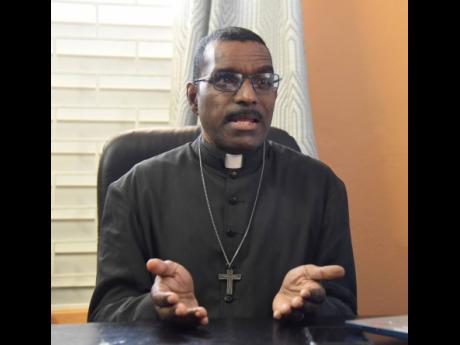One month leave for daddies
Details still missing on new law becomes effective January 1, 2023
With just over three weeks before it comes into effect, some details of the policy proposal that Jamaican men employed to the public sector who become fathers will be entitled to a month’s paternity leave are still missing.
The measure comes 43 years after women became beneficiaries under the Maternity Leave Law of 1979.
The policy change announced by Finance Minister Dr Nigel Clarke in July proposed that public-sector men will be entitled to the benefit as at January 1, 2023. At the time, no details were given, but the new policy proposal includes leave to biological and adoptive fathers and adoptive parents.
Last week, however, several unions representing workers did not respond to a Gleaner request for information on the matter, which now has increasing global support, with generous provisions, especially in Scandinavian countries. Clarke’s announcement in July appeared also to be in keeping with the April 2022 requirement for all European Union (EU) members to offer a minimum of 10 days of paid paternity leave.
Jamaica’s proposal is ahead of the EU’s minimum requirement and ahead of the Caribbean.
The Jamaica Civil Service Association (JCSA), which represents the largest number of public-sector workers, said it approved the proposal for fathers to receive 20 week days or one month leave to begin on January 1. The association’s president, O’Neil Grant, said a draft policy was shared with public-sector unions.
“Yes. The draft policy was shared with the unions in the public sector, and we have given our reactions to the proposals, so they are now in a state of readiness for the Government to finalise and promulgate the policy,” Grant told The Gleaner.
Details shared with Sunday Gleaner states that the JCSA accepted the following proposal.
“Maternity leave will be 60 days and for paternity leave, it will be 20 days. For adoptive parents’ leave, it will be 20 days each for both parents if they work in the public sector. They can take it consecutively or they can take it together. It’s a matter of choice,” Grant explained.
According to Grant, the new policy details the qualification period as well as employer-notification period, but he was unable to recall for the Gleaner the specific period. Grant said the association did not see anything earth-shattering in the new policy, which he views as an upgrade and expansion of the existing Maternity Leave Law to accommodate the fathers.
STANDARD NOTIFICATION TIME
Paternity leave has become increasingly important in modern cultures, and many economically advanced countries have offered generous provisions.
In Scandinavian countries, parents with joint custody are each entitled to 240 days of parental leave. Ninety (90) days are reserved for each of the parents, who may transfer the remaining 180 days to the other parent. Leave for parents with sole custody is 480 days. The top 10 countries with the best provisions are Estonia – 62 weeks; Croatia – 58 weeks; Bulgaria – 58 weeks; the United Kingdom – 52 weeks; Bosnia and Herzegovina – 52 weeks; Montenegro – 52 weeks; Albania – 52 weeks; Ireland – 42 weeks; Macedonia – 39 weeks; and Norway – 35-plus weeks.
Australia and Canada also offer generous provisions.
Grant said the men do not have to be married to qualify, and a standard notification time must be given to the employer before leave can be granted.
According to him, the policy change is coming at the right time.
“It mirrors largely what is in the Maternity Leave Law. The man must have a certain period of employment, and you can’t have more than three such benefits,” said Grant.
Grant said that to the best of his knowledge, the proposal was sent to all unions for their feedback, and it was not a matter for the joint trade unions. As the body representing the largest bloc of government workers, he said it was important that their feedback be sought and given.
However, the proposal appears to have missed the Jamaica Police Federation, which, last week, said it had received neither the proposal nor was it party to any discussion.
The federation’s chairman Corporal Rohan James, said the Police Federation has not seen the draft proposal.
“No, we haven’t seen the draft proposal. I have not received any at the Police Federation. What we have heard, we heard from the media. The minister (Clarke) did not engage us - the Federation -Fon the subject matter,” said James, who is recuperating from surgery.
The Jamaica Constabulary Force (JCF), the Jamaica Defence Force (JDF) ,along with the civil service has the largest bloc of males who would qualify for such leave.
PROPOSAL WELCOMED
With some terms still unknown, it was not clear what the Government proposed and what will finally be approved. However, academic and social anthropologist Dr Herbert Gayle welcomed the proposal, telling The Gleaner that it is a decent start.
“I have heard discussions about it and various proposals. There were discussions for two weeks and for four weeks. I rely on science more than feelings. When you are coming from a situation over the past generation where there is inequity when it comes to dealing with the male parent, then a month is really not bad,” Gayle told The Gleaner last week.
Ideally, it should be more.
“Six weeks would have been better. A month with pay and two weeks without. Just like the clinics place so much importance on the women coming to clinics six weeks after giving birth and also for the baby examination. That six-week period immediately after birth is important to mothers. It should be to fathers as well,” he argued.
Still, he believes it will provide the needed bonding with the newborn and support for the mothers.
Father Sean Major Campbell said he, too, would have preferred six weeks as a start.
“I rather like the idea of at least six weeks’ leave. Any time that may be used to support the baby or baby and mother would be so valuable to the necessary building of family and home. I found most useful the three months’ leave, which I took to coincide with maternity leave,” the outspoken churchman told The Gleaner last week.
He questioned what had informed the idea of the 20 days only, noting that “the principle of equality may have been helpful. What happens if the mother dies during the birth of the child? Still 20 days? What happens if the mother is sickly and cannot nurse the baby?” he asked.
He is batting for equity.
“There are various reasons why the father would reasonably do with the same time afforded mothers. This just means another generation will be tasked with updating this new but limited plan. This is nevertheless a welcome change,” he added.
MATERNITY LEAVE
Meanwhile, the Maternity Leave Law of December 1979 will also formally provide for 60 days leave for the public-sector-employed woman who qualifies.
The woman must be working for 12 months before she becomes eligible, and under the law, if maternity leave is taken before such time, the woman is not entitled to what the law currently stipulates - 40 days with full pay and 20 days without.
However many employers have been paying 12 weeks full pay for years.
The law, which was one of the seminal pieces of legislation under the late Michael Manley administration (1972-1980), will not be amended, but will only reflect a change in policy. Leave for adoptive parents, including mothers, is 20 days and not the three months for the woman who has given birth.
“… The Government of Jamaica (GOJ) intended to increase maternity leave from 40 days to three calendar months; introduce paternity leave, for the first time in the public service, for fathers of newborns, for a specific time and on specific terms; and family leave for adoptive parents, who are bringing a new child into the home, would also be part of the suite of new leave provision,” Clarke announced.
No response was received from other unions contacted.



